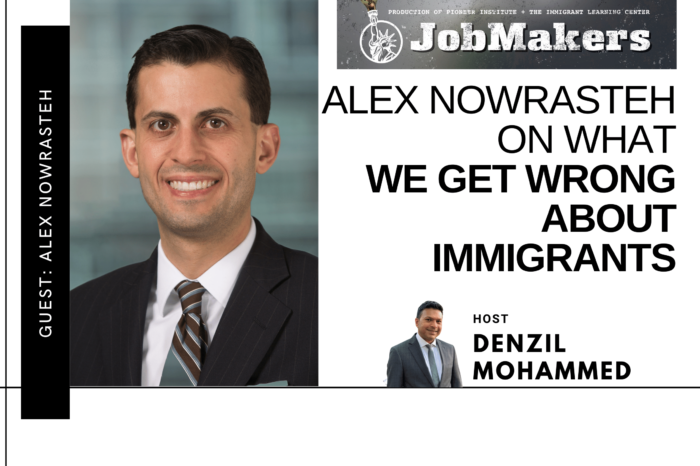Alex Nowrasteh on What We Get Wrong About Immigrants
/in Economic Opportunity, Featured, JobMakers /by Editorial Staff
This week on JobMakers, host Denzil Mohammed talks with Alex Nowrasteh, the Cato Institute’s director of immigration studies and author of “The Most Common Arguments Against Immigration and Why They’re Wrong.” In it, he lays out in simple terms researched responses to anti-immigrant canards like, “today’s immigrants don’t assimilate like immigrants from before,” “immigrants are a major source of crime,” and “immigrants won’t vote for Republicans.” The same things said of immigrants today were said of immigrants a hundred years ago, no matter the group, whether Irish or Italian, Mexican or Haitian. This is the first of a two-part conversation, and some of what you’re about to hear might surprise you. Alex knows that. But getting truth and facts out there is paramount in advancing sensible policies that benefit all Americans, new or old, as you’ll discover in this week’s JobMakers.
We’re going to be off for Thanksgiving but back on December 2nd, when Alex Nowrasteh discusses undocumented immigrants, anti-immigration research and even Ann Coulter (!) in the next JobMakers.
Guest:
 Alex Nowrasteh is the director of immigration studies and the Herbert A. Stiefel Center for Trade Policy Studies. His popular publications have appeared in the Wall Street Journal, USA Today, the Washington Post, and most other major publications in the United States. His peer??reviewed academic publications have appeared in the World Bank Economic Review, the Journal of Economic Behavior, Organization, Public Choice, and others. Nowrasteh regularly appears on Fox News, MSNBC, Bloomberg, NPR, and numerous television and radio stations across the United States. He is the coauthor (with Benjamin Powell) of the book Wretched Refuse? The Political Economy of Immigration and Institutions (Cambridge University Press, 2020), which is the first book on how economic institutions in receiving countries adjust to immigration. He is also the coauthor (with Mark S. Krikorian) of the booklet Open Immigration: Yea and Nay (Encounter Broadsides, 2014) and has contributed numerous book chapters about immigration to various edited volumes. He is a native of Southern California and received a BA in economics from George Mason University and an MS in economic history from the London School of Economics.
Alex Nowrasteh is the director of immigration studies and the Herbert A. Stiefel Center for Trade Policy Studies. His popular publications have appeared in the Wall Street Journal, USA Today, the Washington Post, and most other major publications in the United States. His peer??reviewed academic publications have appeared in the World Bank Economic Review, the Journal of Economic Behavior, Organization, Public Choice, and others. Nowrasteh regularly appears on Fox News, MSNBC, Bloomberg, NPR, and numerous television and radio stations across the United States. He is the coauthor (with Benjamin Powell) of the book Wretched Refuse? The Political Economy of Immigration and Institutions (Cambridge University Press, 2020), which is the first book on how economic institutions in receiving countries adjust to immigration. He is also the coauthor (with Mark S. Krikorian) of the booklet Open Immigration: Yea and Nay (Encounter Broadsides, 2014) and has contributed numerous book chapters about immigration to various edited volumes. He is a native of Southern California and received a BA in economics from George Mason University and an MS in economic history from the London School of Economics.
Get new episodes of JobMakers in your inbox!
Read a Transcript of This Episode
Please excuse typos.
Denzil Mohammed:
I’m Denzil Mohammed. And this is Jobmakers.
Denzil Mohammed:
For time immemorial, we’ve been hearing the same messages, immigrants take this, or immigrants increase that, or immigrants have used this. I say time and Memorial, because the same thing set of immigrants today, we’re set of immigrants a hundred years ago. No matter the group with the Irish or Italian, Mexican or Haitian, those already living here, but did the same things for Alex Nowrasteh. The Cato Institute’s director of immigration studies. He’s heard it all before over and over again. So last summer he compiled a quick and easy publication. Anyone can download it, call it the most common arguments against immigration and why they were wrong. You can get at a Cato’s website or libertarianism.org in it. Alex lays out in simple terms, researched responses to anti-immigrant fabrications. Like today’s immigrants. Don’t assimilate like immigrants from before and immigrants are a major source of crime and immigrants won’t vote for the Republican party. This is the first part of our conversation. Then some of what you’re about to hear might surprise you. Alex knows that, but getting truth and facts out there is paramount in advancing sensible immigration policies that benefit all Americans new or older as you’ll discover in this week’s Jobmakers,
Denzil Mohammed:
Alex Nowrasteh from the Cato Institute. Thank you for joining us on Jobmakers. How are you?
Alex Nowrasteh:
Great. I’m doing well. Thanks a lot for having me looking forward to this.
Denzil Mohammed:
So you recently released a report on the most common arguments against immigration and why they’re wrong. Why did you feel the need to do this?
Alex Nowrasteh:
So I’ve been speaking and writing about immigration for over a decade and I basically get the same questions every time. And I figured, you know, these questions are probably, you know, the ones that everybody has about immigration. So it just be very convenient for everybody. If I wrote down my quick answers to all of them, with citations and links, to other research, to give people out there who are getting these questions, but don’t have the benefit of having done like years and years of research on each of them like I have. So that’s what basically gave me this impetus sort of like a cheat sheet for everybody to know sort of what I’m thinking. Whenever I get these questions.
Denzil Mohammed:
One of the biggest misconceptions that I found in your report was the one on vo-tech that immigrants are automatically going to vote blue. That is not necessarily true in California is a good example of that California and Texas, the two states with the
Alex Nowrasteh:
Largest immigrant populations, right? Yeah, that’s right. You know, California and Texas and interestingly, you know, part of the argument against voting or, or the idea that immigrants and their kids are going to vote for the democratic party in perpetuity, right. Forever is it’s partly focused on immigration. Of course, it’s also focused on largely Hispanics. It’s the idea that Hispanics, whether they’re native born or foreign born, or just this, this, this permanent blue voting block. And, you know, if you look back at history, if you look at what’s going on today with political realignment, I mean, that’s just simply not true. There’s so much evidence to the contrary. That is kind of it’s kind of overwhelming, but what we really hear is this, this crazy narrative about how this is a, you know, some new voting block in Porter, by the Democrats, supposedly to create sort of democratic party dominance, which I don’t know when that’s ever existed since you know, the new, since the 1960s.
Alex Nowrasteh:
So and I can talk about sort of why, I mean, you know, the, the history of this is, is kind of fascinating. So I’m from California. And when I was young in 1994, there was a debate, a statewide proposition that everyone gets to vote on called prop 180 set proposition, 180 7 and prop 180 7 to two things. One was that it denied well for a benefits and other government benefits to all unlawful or illegal immigrants in the state. And then the second thing was that told every single state official that if they suspect that somebody is an unlawful or illegal immigrant, they have to report that person to the ins at the time for deportation. And what happened was in 1994, this was pushed by then governor Pete Wilson, who was Republican. He was facing a pretty hard reelection campaign in 1994 in California.
Alex Nowrasteh:
You know, the economy wasn’t doing well. The end of the cold war really hurt a lot of defense industries in California. So he was facing like an uphill battle. And so he sort of latched on to this proposition 180 7 as a way to galvanize voters to support him so that he could win reelection. And what’s fascinating is you take a look at this in 1990, when peoples and first ran, he basically split the Hispanic vote on the state level with Democrats. Basically you got like 47%. The Democrats got like 48%, 1990. It switches. He basically the Republican Pete Wilson got like 25% Democrat got like 70%, but Pete Wilson barely pulled it out because he got so many more votes from, from black Americans, white Americans and Asian Americans. But then you fast forward to like 1998. And you see that Hispanic vote for Republicans keeps going down. It goes down to like 17% and a state like California, but the Hispanic population grows from like 10% in 1970 to 40% around the year 2005. That’s a devastating shift. And basically what happened was the Republican party in California in my home state decided we really needed to win this election in 1984. Let’s off the largest demographic in the state. That’s growing the fastest. And you know, be surprised when we lose basically every election after that, except when Arnold Schwartzenegger is running.
Denzil Mohammed:
So you concluded based on this, that it’s how immigrants vote. It depends on, on how the party treats them, particularly Hispanic voters.
Alex Nowrasteh:
Yeah. Surprisingly, right. No, I’m just joking, right? I mean, it’s obviously not surprising, you know, human beings are you know, they don’t want to vote for people who hate them. James Carville who the democratic strategist has said this, I point blank. If voters think that you hate them, they won’t vote for you
Denzil Mohammed:
Talk about assimilation. And that’s of course, one of the biggest myths when it comes to immigration that today as immigrants, don’t assimilate as immigrants from the past, did, how are they wrong?
Alex Nowrasteh:
So assimilation, we basically measure it as whether, you know, the immigrant or the immigrants, kids, or grandkids, like how similar they are to Americans. Who’ve been here for much longer period of time on issues like education, income, civic participation, which includes like voting, volunteering whether they nationalize, whether they call themselves American and consider themselves to be American. And on these measures from survey questions that go back in some cases over a hundred years, what we see is that basically by the third generation, that is the grandchildren of the immigrants themselves, their grandchildren across the board on on average are basically identical to Americans who have been here for four or longer generations. In terms of all of these measures. Now, some groups take a little bit longer than others. There are a lot of Hispanic immigrant groups because when they come here, they have a little bit less education, takes a little bit wild, earn that education and pass it on to their kids.
Alex Nowrasteh:
That can take three. Sometimes four generations with Asian immigrants is basically the first or second generation because they typically come here with higher education level. They already speak English when they arrived. And that sort of jumpstarts assimilation. And there were also seen is a lot of intermarriage. So a lot of Hispanic immigrants are Asian immigrants. They will marry a non Hispanic or non-Asian American. The kids will be mixed their kids. Won’t self identify as that ethnic minority or racial minority. And because of this sort of intermarriage, what happens is that basically pushes along a simulation. It speeds it up by like an extra generation. So I have to call it a simulation of the altar. And that’s something that happened in the past, right? That’s what happened with Irish, with Italian immigrants, but German immigrants. Like if you notice right through this conversation, a lot of overseen today is what people were noticing like a hundred or 130 years ago with the immigrant groups that were coming then is this happening with a whole new group of people in the United States?
Alex Nowrasteh:
And it turns out it’s just, it’s not that different. And in some ways it’s a little faster. So it took on average, the Irish about five generations to assimilate by our measures. And that’s probably because the Irish, when they came here, they were like, especially poor, especially devastated, especially sort of poorly educated and coming from a real backwards part of Europe at that time, they’ve caught up, Ireland caught up, but back then, it was like really backwards by comparison to the United States, right? Like they didn’t even use money in large parts of Ireland because there was basically a feudal economy where you would pay your landlord and produce that you made from your farm. And then you get shoved into like industrial aged in New York. Crazy. Right. Crazy transition. But if you think about today, like an immigrant from, from Mexico or from India or from Nigeria, they don’t have to learn how to read a clock.
Alex Nowrasteh:
They don’t have to learn what, you know, how to use money. They don’t have to learn how to rent an apartment. Like they know all these things already and they have some exposure to American culture through TV and music and everything else. So in a sense, there’s a ton of pre assimilation going on around the world because American culture is so dominant. The English were just so dominant globally that it really helps jumpstart that process. So if I were like looking backwards at time from the year, like three thousands, I would say the assimilation trends in the United States around the year 2021 are far superior to what they were in the United States in the year, like 1921. I’m just that much more optimistic about it.
Denzil Mohammed:
That’s fascinating that clearly this has happened before. This is a natural phenomenon that happens when people move and whether they came from Ireland or from, or from Italy or from Guatemala, it’s probably going to follow the same, the same trajectory. One of the other biggest misconceptions that you addressed is on crime. And it’s, it’s interesting to note that as populations have increased in the U S that’s in Metro areas, violent crime rates have gone down yet. We’ve seen this mushrooming of immigration to the U S since the late sixties. Tell me a little bit about that and how, how do you count to people who come with other statistics about immigrants and crime that totally contradict yours?
Alex Nowrasteh:
Yeah. So what you said is absolutely right, going back amps, actually to the sort of late 19th century, there have been about half a dozen different government commissions that have studied the issues of immigrant assimilation in the United States. And most of these commissions have been stacked against immigration. They’ve been but the alibi Congress and basically nativists are put on the boards to study these things. And, but what’s remarkable is every time from the early 20th century, from the Dillingham commission, which recommended quotas to keep out Southern and Eastern Europeans, because they were genetically, you know, genetically inferior, as opposed to like up until like the Barbara Jordan commission, the 1990s that took a look at immigration, also staffed with a bunch of people who are anti-immigration on that commission. Every single one of them has found, you know, they, they say bunch of negative things about immigration, but they have all admitted that immigrants are much less likely to commit crimes, the native born Americans, and much less likely to be incarcerated.
Alex Nowrasteh:
So this is something that goes back over a century, this finding and continues to today. In fact, when you take a look at the census data, because we do have census data on crime, and we take a look at those who are incarcerated in American prisons, the foreign born population is below that the foreign born population in prison as a percentage, is below their percentage of nationwide population. And we know that for a fact that is uncontested. What other people say though, is, you know, I may believe Alex that legal immigrants have a much lower crime rate, but then they say illegal immigrants have a much higher crime rate though. And they say that because while they broke immigration laws, so they must be more likely to commit like other crimes or to commit crimes rather than just these immigration law violations and then culture in her book, adios America, which, and I say this on ironically is actually a great book because you will understand what an anti-immigration person thinks about all this stuff.
Alex Nowrasteh:
Like in very clear detail, I learned more from that book, I think, than any other book on immigration to put it like surprisingly. And what she said is, you know, illegal immigration is a huge source of crime. And the reason why, you know, that is because no state counts criminal activity or convictions or arrests by immigration status. And she has this funny line in her book where she says like Nielsen American census bureau, people know how many pigs are being raised on American farms, but you’re telling me they don’t know how many criminals who were arrested or illegal immigrants. Of course they’re hiding it. And she says, they’re hiding it to cover up, you know, some, some great things. And what’s hilarious, very scientific by the way. Oh yeah. Very, very scientific criticism. I mean, it’s just, you know, like right-wing oh, you know, it’s just like this nativist sort of like paranoia, right.
Alex Nowrasteh:
But what’s fascinating is she’s right. About 49 states, 49 states do not count criminal crime or convictions or arrests by immigration status, the one state dots. And that’s the state of Texas, which is like the best state to measure for this. It’s a border state. And it has like the it’s one of the greatest numbers of immigrants in the country. Second greatest number of immigrants in the country are in Texas. The second largest on lawful or illegal immigrant population is in Texas. And a lot of them are Hispanic, which when people talk about crime and immigration, they’re mainly talking about Hispanic immigrants. They’re not really complaining about Asian immigrants. They’re complaining about Hispanic immigrants. And even better, Texas has been governed by Republicans for about 27 years nonstop. So there’s no argument you can make about some kind of liberal conspiracy to cover up illegal immigrant crime, right?
Alex Nowrasteh:
Like there want to report it. And what does it show? It shows me, you take a look at the Texas state data on this. You take a look at crimes criminal convictions committed by people by immigration status. You find that illegal immigrants have a criminal conviction rate about 37% below that of native born Americans and illegal immigrants have one that’s 57% below native born Americans. And that’s, you know, as a percentage of each subpopulation. So it’s like this to give you an example like the, the native born American criminal conviction range 2019 was 1,190 convictions for every hundred thousand native born Americans for illegal immigrants, eras 749 convictions for illegal immigrants for every a hundred thousand and for legal immigrants who was 510 for every a hundred thousand. So it’s just like clear as daylight that these numbers line up and incredible way.
Alex Nowrasteh:
And when you take a look at even, you know, different crimes like homicide, when you take a look at sex crimes, when you take a look at larceny, but you take a look at all these crimes, you go down the list and about the same relationship holds, you know, immigrants, legal immigrants, and illegal immigrants are much less likely to commit homicides and be convicted of them or arrested for them. Well, larceny it’s the same thing. Sex crimes is the same thing. So this is just across the board. We take a look at this and this is, and this is what holds, and you know, people, people spend a lot of time arguing about why this is the case, but we’ve come to the point now where people don’t really dispute that this is the case that legal immigrants and illegal immigrants have a much lower crime rate.
Alex Nowrasteh:
This has been a sea change in opinion the last couple of years, but I finally convinced people even Mark Krikorian, I even convinced him he has this great quote in the Dallas Morning News where somebody asked him about my paper. And he said, oh yeah, there’s a lot of evidence that illegal immigrants have a much lower crime rate than native-born Americans. The only response they have is, well, one is too many. And if you want to talk about how to allocate scarce law enforcement resources to diminish crime, knowing which populations by immigration status are the most dangerous is worth knowing because we only have so many police officers so much, so many resources to develop the best. And if you really want to make an impact on crime, you should police more than native born population, which I’m sorry to say us native born Americans are super crime prone and super more likely to kill each other. Then you should police illegal immigrants or illegal immigrants.
Denzil Mohammed:
That is such a powerful point. It better resonate because I mean, this is what the data is consistently shown. And to remind listeners that for instance authorized immigrants, people who are hoping for their green cards, for instance, they walk a very, very tight rope when it comes to committing crimes. They can be instantly deported if they commit certain kinds of crimes. So they ha they have additional input as to stay on the side of public safety versus us board who don’t have that kind of risk.
Alex Nowrasteh:
Yeah, that’s right. So, so Gary Becker, who’s a late Nobel prize winning economist. He studied the economics of crime and he said, you know, if you want to understand the turrets for crime, you need to sort of multiply the chance of being caught times the punishment. And that will basically be the deterrence. And the thing is for any crime, any immigrant, whether they’re lawful or illegal immigrants, unlawful or illegal, who is not a citizen of the United States, the punishment of being caught for convicted command and crime is much greater because the punishment is they get the serve their prison sentence, and then they get court and being deported is not technically a crime under us law, but from the perspective of the immigrant, it is oftentimes a much bigger punishment than being in prison. And as a result of that, the deterrence factor is enormous. And as a result of that, deterrence got to be an enormous people who decide to become immigrants are just going to be those types of people who just don’t really want to commit crimes because they’re thinking ahead. And the one thing we know about criminals is they don’t really think ahead and immigrants. One of the things we do know is, you know, they’re doing it for the future for themselves and they, and they really think I had,
Denzil Mohammed:
They do it for the future. They want to establish a better life for themselves and their kids putting that in jeopardy. They don’t want to do that. That’s not in the equation and thinking long-term, I mean, that’s a fascinating way to put, to, to, to position immigrants. And that’s really very true.
Alex Nowrasteh:
It’s like an investment, you know, it’s like, it’s an investment that they make in themselves. And in the United States, as a result, the median immigrant who comes here to the United States from a country around the world can expect a four fold increase in income, adjusting for cost of living. Right. That is like tremendous. I’ve never had a job where it’s like one job to the next it’s a fourfold increase. Right. I just can’t imagine. And a fourfold increase for somebody from, from, from, from Latin America or from Africa or from Asia. That’s a lot bigger difference in terms of the standard of living than our four fold increase. For me, it would be right. Like you increase my inbound by a factor of four. Like I’ll buy another house, you know, or something like that. I’ll fly first class. Okay. That’s nice. Right. But it’s not going to be the difference between me sending my kids to school or not. It’s not the difference having like a doctor she adopted when I’m sick and not, it’s not the difference between me being able to retire at some point and not that’s what the fat, that’s, what these people face. So it is tremendous investment and themselves. And as a result, they invest in the United States as better for all of us
Denzil Mohammed:
Better for all of us, they want better paying jobs. They want to climb the ladder. They want to make more money. They pay more in taxes as a result, immigrants or refugees give back more than the benefits that they initially received. Job makers is a weekly podcast about immigrant contributions is two topics and research produced by Pioneer Institute, a think tank in Boston and the Immigrant Learning Center in Malden, Massachusetts, a not-for-profit that gives immigrants a voice. Thanks for joining us for today’s gripping discussion on the facts to combat all those anti-immigrant messages. If you have feedback or know someone, we should talk to email Denzil, that’s D E N Z I L at jobmakerspodcast.org. We’re going to be off for Thanksgiving, but back on December 2nd, when Alex Nowrasteh discusses undocumented immigrants, anti-immigration research and Ann Coulter in the next Jobmakers.
Recent Episodes
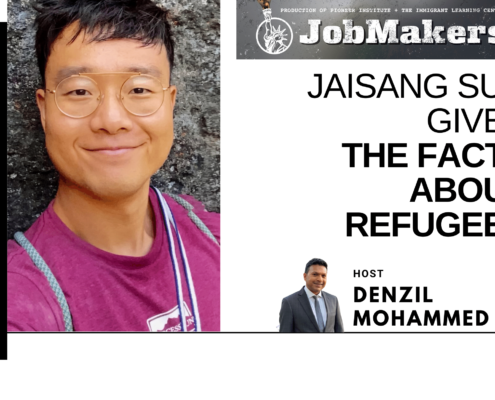
Jaisang Sun Gives the Facts About Refugees
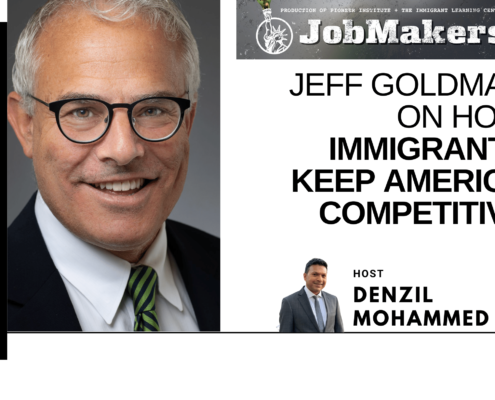
Jeff Goldman on How Immigrants Keep America Competitive

Trevor Mattos Shows How Massachusetts Runs on Immigrants
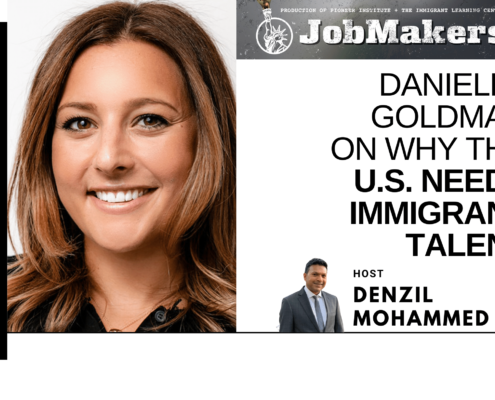
Danielle Goldman on Why the U.S. Needs Immigrant Talent
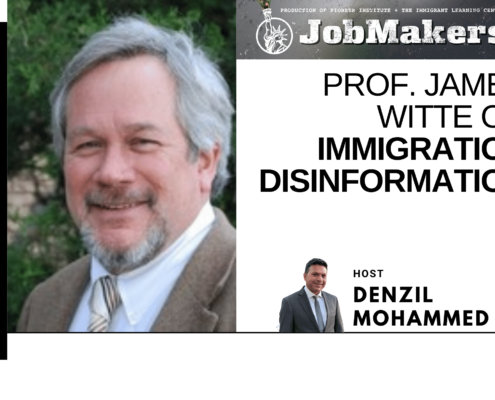
Prof. James Witte on Immigration Disinformation
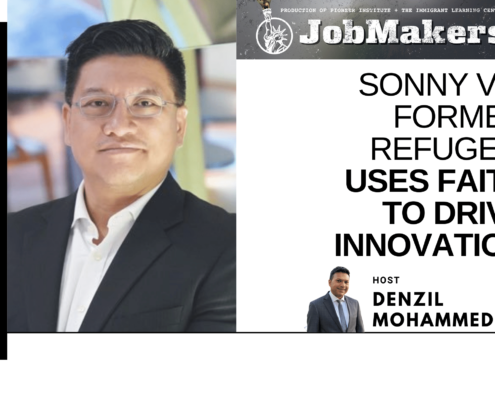
Sonny Vu, Former Refugee, Uses Faith to Drive Innovation
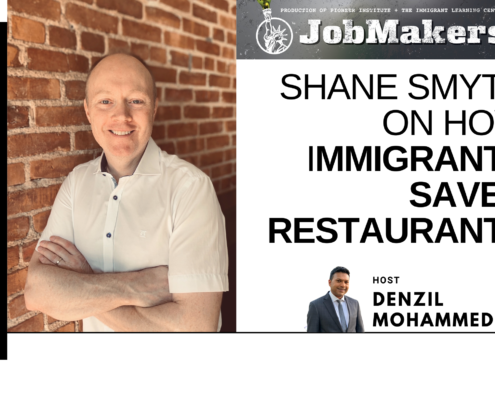
Shane Smyth on How Immigrants Saved Restaurants


